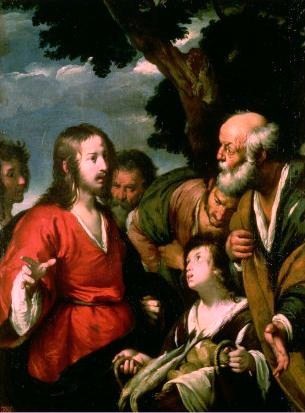In a world starving for fulfilment, Jesus sets a table of love every day. Yet the bread of life is passed over by so many who seek the latest confection to fill their emptiness. In this gospel Jesus invites us to his feast. His basket of grace is bottomless. Come to him as God and Savior and you will never go away hungry.
In this gospel what seems like a pretty straight forward narrative means widely different things to different people. Google this Loaves and Fishes gospel and you’ll be swamped by 908,000 entries. There is a large body of thought that sees this as a clever bait and switch by Jesus. His preaching supposedly cajoled the crowd into sharing a horde of food they had secreted away. Then there are the numerology obsessed. They see great significance in the number of loaves and fishes, the count of the crowd and the baskets of leftovers. Their zeal for minutia is only exceeded by the hyper-analytic who expound on why barley loaves instead of wheat, why fish, why the crowd reclined, and on and on.
Of all Christ’s miracles, the Resurrection and the Loaves and Fishes are the only ones that get this much attention. They are the only ones recounted in all four gospels. And while the Resurrection towers above all, the Loaves and Fishes is the one which involves the greatest number of immediate participants. Yet despite its familiarity, from a sampling of the Google entries, its full meaning often escapes understanding.
First, let’s give the miracle its due by using its full name: “The Multiplying of the Loaves and Fishes.” The full name is useful because multiplication is at the heart of the miracle. It was certainly in Christ’s power to create a lavish banquet from scratch; including a heavenly desert cart and Moses as an after-dinner speaker. But Christ did not come to perform parlor tricks. As in all things, he is teaching us a lesson. This one involves some elementary math. A million times nothing, is still nothing. But a million times a morsel is a feast. Jesus took the meager loaves and fishes from the poverty of the people, blessed and broke them and then gave them back in satisfying superabundance.
Could the message be any plainer? Jesus is telling us to come to him in our want. Bring our meager scraps of faith and he will turn them into a feast of fulfilment. Have the confidence to surrender a short, cramped mortal life and he will give you back an immortal life of endless joy.
Jesus explains the mystery of salvation by playing it out in this tableau of an impromptu picnic. The Messiah, God and Man, has come among us. His bounty is bottomless. He offers eternal life, there for our taking. He asks only that we come as we are, bringing what we have… our struggling faith and our flawed love. What we give to him will be blessed and miraculously multiplied on a cosmic scale. By his grace we will be satisfied beyond imagining.
Too many of us see the feast of salvation as something that lies over a distant horizon. But Jesus is not here to take reservations for a banquet far in the future. We need his grace right here, right now. Here is where we struggle… where we need his strength the most. And right here, right now… in his word, in our worship, in our fellowship, in our outreach is where we are fed.
But make no mistake, Jesus does not feed us abundantly so we can become spiritually self-absorbed… basking in his favor… indolent in his service. We are meant to put all this ingestion of energy to work. In faith we must shoulder our cross… facing challenges, enduring disappointments, forgiving betrayals. But far beyond that, we must be Christ’s hands in the world… working to build the kingdom, witnessing his love in all that we do.
In this gospel and in every passage of the Good News, there is a single unifying message: God loves us. And Christ is literally the embodiment of that love. Where we see scraps, he creates abundance. Where we see emptiness and depression, he creates profound fulfilment and boundless joy. In his love we are nourished and protected. He is the bread of life, infinitely enriched and multiplied for our salvation. Come to his feast… and never walk away hungry. Live in his love… and the feast never ends.
The Reverend David Sellery, Episcopal Priest, Author, and Coach. Fr. Sellery presently serves as Priest-in-Charge, St. John’s Salisbury, CT. Fr. Sellery has excelled at using new media to increase outreach beyond the Church doors via his website, blog posts, and podcasts.
Image: By Bernardo Strozzi [Public domain], via Wikimedia Commons

